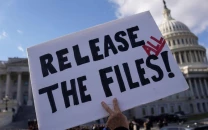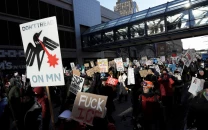Tech giants’ inaction over anti-Muslim social media tide creating ordeals
Users from three countries including India generated 86% of malicious online content that led to attacks on Muslims

The apparent unwillingness of social media tech-giants to permanently remove the conspiracist and racist online content on different platforms that are whipping up hatred against Muslims and their faith, has been creating inexplicable problems for the community worldwide.
It was also casting a chilling effect and prevented the Muslims from exercising their freedom of religion and speech online, the Centre for Countering Digital Hate (CCDH) said in its report.
The big tech’s continued failure to act on anti-Muslim hate created an ecosystem that restricted freedom of expression and pushes marginalised people off their platforms, all while allowing white supremacist, extremist, and hateful content to thrive and provide their shareholders with record profits, the report said.
The CCDH is a US non-profit corporation headquartered in Washington DC, and CCDH UK is a UK non-profit company headquartered in London.
According to different reports, Twitter, Google and Meta launched special efforts as part of a “shared commitment to counter hateful conduct online, however, they failed to control these materials.
Read more: 26 Muslims booked for offering congregational prayer in India
Twitter failed to remove about 3.8 million anti-Muslim tweets (posted between Aug 19 and Aug 21) as it could only remove 15% of the tweets (0.57 million were taken down out of the total one).
The popular micro-blogging platform is fast becoming a primary source for the proliferation of anti-hate content against Muslims and their faith.
Users from the three countries including India generated 86 per cent of malicious online content in the last few years that led to physical attacks on Muslims and mosques across the globe, a study by Asian Peace said.
Now approximately 55.12% of anti-Muslim hatred tweets originated from Indian social media activists.
Researchers have identified several key themes churned out from three countries which included the association of Islam with terrorism, depiction of Muslims as perpetrators of sexual violence, and declaring “halal” as an inhumane practice that typifies the so-called “barbarity” of Islam.
On the other hand, the UN had strongly encouraged the international community to “take all necessary measures” to combat discrimination against Muslims while warning that anti-Muslim hatred has reached “epidemic proportions.”
In this connection, the UN had declared Anti-Islamophobia Day on March 15 due to the efforts of Pakistan which was a laudable step however, more desired to be done by the world and technological companies to stem surge of such trends worldwide.
#UNGA proclaims 15 March the International Day to Combat Islamophobia.
— United Nations (@UN) March 16, 2022
General Assembly calls for strengthened international efforts to foster global dialogue on promotion of culture of tolerance & peace, based on respect for human rights & for diversity of religions & beliefs. pic.twitter.com/DTf2dLYNeB
As per a study by the Islamic Council of Victoria, Australia (ICV), a body representing Muslims in the state of Victoria with an estimated 270,000 Muslims as its member, found in its report that nearly four million anti-Muslim posts made during a 24-month period between 2017 and 2019.
In its report, ICV said that more causes for rise of such social media trends included the war on terror, media reporting, and right-wing groups and politicians across the globe, not just in the western countries but in places such as Myanmar and India, that spread false and malicious rhetoric to whip up anti-Muslim sentiment.
Also read: WATCH: BJP leader openly confesses to killing five Muslims
“These far-right groups are often networked and share information online to amplify their messages. In fact, much of the worst forms of Islamophobia and anti-Muslim incitement happens online,” it added.
Social media companies are failing to act on 89% of posts containing anti-Muslim hatred and Islamophobic content reported to them, according to Centre for Countering Digital Hate (CCDH).
“This report exposed that social media companies, including Twitter, Facebook, Instagram, TikTok and YouTube, failed to act on 89% of posts containing anti-Muslim hatred and Islamophobic content reported to them,” it says.
The social media giants had stated that they would be resolute in their commitment to ensure they were doing all they could to fight the hatred and extremism that lead to violence.
Noting with concern that #Islamophobia, as a contemporary form of racism and religious discrimination, is on the rise in many parts of the world, the #OIC Secretary General renews the OIC call to the United Nations and other international and regional organizations ...4/5
— OIC (@OIC_OCI) March 15, 2021
“Once again, their press releases prove to be nothing more than empty promises,” the report said.
The CCDH researchers reported 530 posts that contain disturbing, bigoted and dehumanising content that target Muslims through racist caricatures, conspiracies and false claims.
These posts were viewed at least 25 million times. Much of the abusive content was easily identifiable, and yet there was still inaction, it said.
Stating that Instagram, TikTok and Twitter allow users to use hashtags such as #deathtoislam, #islamiscancer, the report further said content spread using the hashtags received at least 1.3 million impressions.
The report, ‘Islamophobia in the Digital Age’, said that in the US, though, Islamophobia has long been a problem, one that “was dramatically exacerbated by the racist, conspiratorial and inflammatory rhetoric employed by Donald Trump.
As for the UK, the prevalence of anti-Muslim tweets was attributed to a multitude of factors, including the global reach of Trump’s hatred, the country’s longstanding issues with the anti-migrant sentiment, and the casual racism of former prime minister Boris Johnson, the report wrote.
The 2019 Christchurch Mosque attack and other such like incidents across the globe were all illustrative of this vicious cycle. The incidents of anti-Muslim abuse spiked upwards by a staggering 1300 % in New Zealand, and 600 % in the UK.
According to "South Asia State of Minorities Report 2021" the phenomenon of the spread of social media hatred against minorities had only worsened in Indian society in recent years since, progressing up the UN’s hate speech chain from the "bottom" level offensive or disturbing content to "top" level incitement to hostility, discrimination and violence.
In December 2019, the violent slogan "shoot dead the bastard traitors to the nation" was popularised by a BJP leader in Delhi, as part of a wider campaign in response to Muslim-led protests against India’s changes to its citizenship law, widely seen as being discriminatory.
UN expert @ahmedshaheed says anti-Muslim hatred rises to epidemic proportions and urges States to act against widespread negative representations of Islam, hostility, violence and #Islamophobia.
— UN Special Procedures (@UN_SPExperts) March 4, 2021
New report at @UN_HRC 👉 https://t.co/LNTEUHToDT#StandUp4HumanRights #HRC46 pic.twitter.com/qQf7wc0qjT
In March 2020, as the Covid-19 pandemic took hold, India witnessed yet another deluge of hate content and misinformation, falsely blaming the country’s Muslims for the outbreak and calling for social and economic boycotts, and even physical violence against them.
A great deal of hate in India played out on social media. A study by Equality Labs in 2019 revealed that Islamophobic content was the biggest source of hate speech on Facebook and Twitter, amounting to 37 per cent of the content reviewed.
Caste-based hate speech is also common, accounting for 13 per cent of the Facebook content reviewed by Equality Labs.
According to Amnesty International, a total of 902 alleged hate crimes were reported in India between September 2015 and June 2019, resulting in 303 deaths.
Of the 902 documented instances, 621 were reported to have been motivated by caste, with the victims of these being overwhelmingly Dalits (99.5%).
Of the rest, 217 were reported to have been primarily motivated by religion, with Muslims (89%) and Christians (8%) being the main targets.
Religiously motivated hate crimes resulted in a total of 91 deaths, of which 87 per cent were of Muslims. A total of 113 hate crimes were traced directly to the ruse of cow protection.
A study by Reporters Without Borders (RSF) noted that the production of media content and distribution are increasingly combined and concentrated in the hands of a few, and that many leading outlets at both the national and regional levels were controlled by individuals with direct political ties to the BJP, or by corporate conglomerates who have been openly supportive of the BJP.
Online social networking platforms such as Facebook and Twitter have hundreds of millions of Indian users, and also become important channels through which anti-minority hate content is spread.




1721969212-0/BeFunky-collage]-(35)1721969212-0-208x130.webp)














COMMENTS
Comments are moderated and generally will be posted if they are on-topic and not abusive.
For more information, please see our Comments FAQ